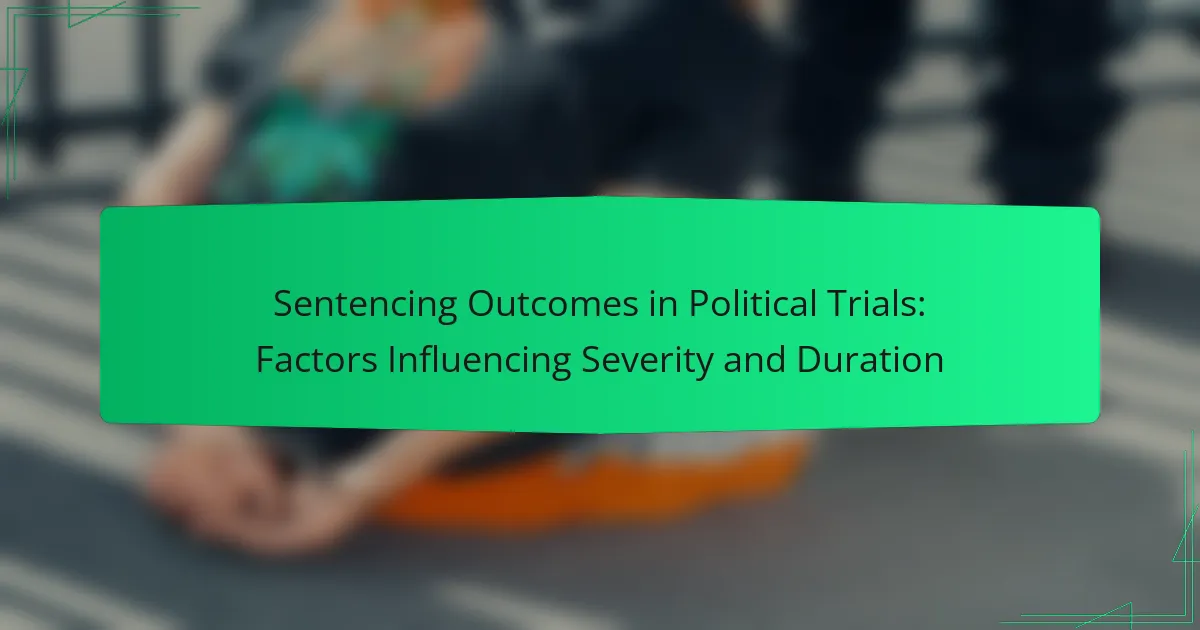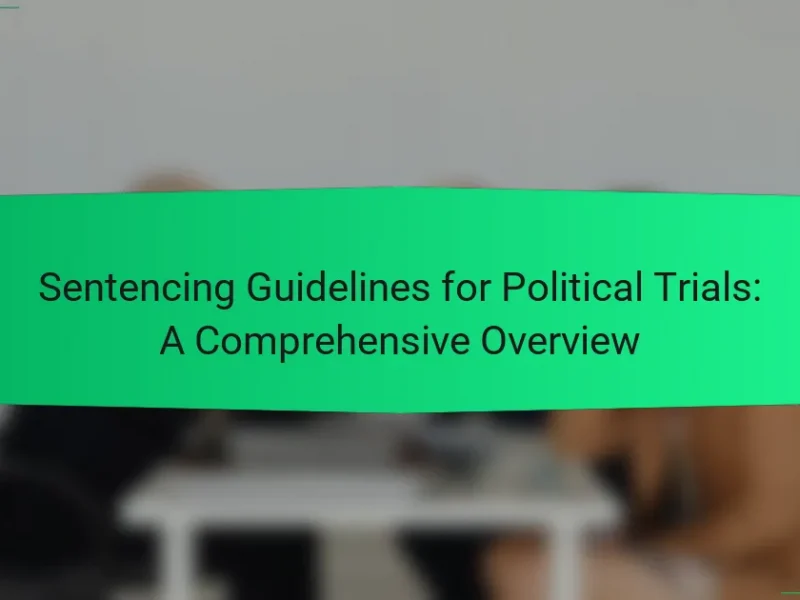Sentencing outcomes in political trials refer to the legal consequences faced by individuals convicted of politically motivated offenses. These outcomes are influenced by various factors, including the nature of the offense, the political context, and public sentiment, resulting in a range of penalties such as imprisonment, fines, or community service. The severity of these sentences often reflects the perceived threat to the state, with harsher penalties prevalent in authoritarian regimes compared to democratic systems. The implications of sentencing extend beyond individual cases, impacting public perception, political stability, and international relations. Best practices for sentencing in political trials emphasize transparency, impartiality, and adherence to legal standards to ensure fair and equitable outcomes.
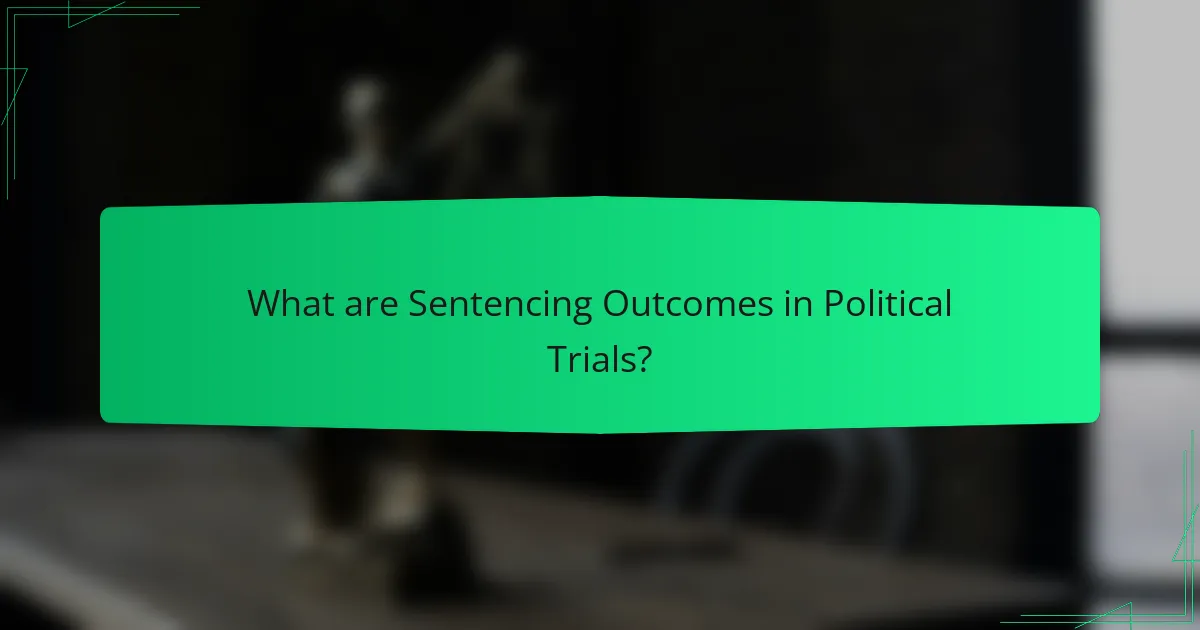
What are Sentencing Outcomes in Political Trials?
Sentencing outcomes in political trials refer to the legal consequences imposed on individuals convicted in cases with political implications. These outcomes can vary significantly based on factors such as the nature of the political offense, the jurisdiction, and public sentiment. Common sentencing outcomes include imprisonment, fines, or community service.
For instance, political dissenters may face harsher penalties in authoritarian regimes compared to democratic systems. Historical examples include the imprisonment of political activists during uprisings or revolutions. Research indicates that the severity of sentencing often correlates with the perceived threat to the state. In some instances, political trials may result in leniency due to international pressure or public outcry.
Thus, the outcomes are influenced by a complex interplay of legal standards, political context, and societal attitudes towards the defendants.
How are sentencing outcomes determined in political trials?
Sentencing outcomes in political trials are determined by various legal and extralegal factors. These factors include the nature of the charges, the evidence presented, and the political context of the trial. Judges often consider the defendant’s political affiliations and the potential impact of the verdict on public opinion. Additionally, the influence of government and political pressures can affect sentencing decisions. Historical precedents and the legal framework also play a crucial role in shaping outcomes. For instance, political trials may involve harsher penalties due to the perceived threat to state stability. These dynamics create a complex interplay that influences the final sentencing.
What legal frameworks govern sentencing in political trials?
Legal frameworks governing sentencing in political trials vary by jurisdiction. These frameworks often include constitutional provisions, statutory laws, and international human rights standards. For example, in many democratic nations, due process rights are enshrined in their constitutions. Statutory laws may outline specific offenses and corresponding penalties. International treaties, like the International Covenant on Civil and Political Rights, influence domestic laws. These legal frameworks aim to ensure fairness and justice in political trials. They also guide judges in determining appropriate sentences based on the nature of the offense and the context.
What role do judges play in determining sentencing outcomes?
Judges play a crucial role in determining sentencing outcomes. They interpret laws and apply legal standards to individual cases. Judges evaluate the facts presented during trials. They consider the severity of the crime and the defendant’s history. Judges also assess the impact of the crime on victims and society. They have discretion in sentencing, allowing for individualized outcomes. Additionally, judges must adhere to sentencing guidelines set by law. Their decisions can influence the length and type of sentences imposed.
What factors influence the severity of sentencing outcomes?
The severity of sentencing outcomes is influenced by various factors. Key factors include the nature of the crime, the defendant’s criminal history, and the presence of mitigating or aggravating circumstances. The legal framework and statutory guidelines also play a significant role in determining sentence length. Additionally, judicial discretion allows judges to consider individual case details. Public sentiment and media coverage can impact sentencing severity as well. Research indicates that harsher penalties are often applied in politically charged cases. Studies show that defendants with prior convictions receive longer sentences. Factors such as race and socioeconomic status may also influence sentencing disparities.
How does the nature of the political offense impact sentencing severity?
The nature of a political offense significantly impacts sentencing severity. Different types of political offenses, such as treason, sedition, or terrorism, carry varying legal frameworks and consequences. For instance, treason often results in harsher penalties due to its perceived threat to national security. Sedition, while serious, typically incurs lighter sentences compared to treason.
Additionally, the context of the offense plays a crucial role. Offenses committed during times of political unrest may lead to more severe sentences as governments seek to deter dissent. Historical examples illustrate this, such as the severe penalties imposed during authoritarian regimes.
Moreover, the political climate and public sentiment can influence judicial outcomes. Courts may impose harsher sentences in politically charged environments to align with governmental interests. Thus, the nature and context of political offenses directly correlate with the severity of sentencing.
What role does public opinion play in influencing sentencing outcomes?
Public opinion significantly influences sentencing outcomes in legal cases. Judges and juries often consider societal attitudes toward crime and punishment. When public sentiment favors harsher penalties, it can lead to increased sentences. Research indicates that high-profile cases often result in more severe outcomes due to media coverage and public outcry. For instance, studies show that public pressure can sway judicial discretion. In political trials, this influence may be even more pronounced due to the charged atmosphere surrounding such cases. Ultimately, public opinion serves as a potent factor in shaping judicial decisions and sentencing severity.
What factors affect the duration of sentencing outcomes?
The duration of sentencing outcomes is affected by several key factors. These factors include the severity of the crime, the defendant’s criminal history, and the presence of mitigating or aggravating circumstances. Sentencing guidelines established by jurisdictions also play a significant role in determining duration. Judicial discretion allows judges to consider individual case details, impacting the final sentence. Additionally, plea agreements can shorten sentencing duration significantly. The effectiveness of legal representation can influence case outcomes as well. Studies have shown that defendants with experienced attorneys often receive more favorable sentencing. Finally, public opinion and political pressures can also affect sentencing outcomes in politically charged cases.
How do plea deals and negotiations influence sentencing duration?
Plea deals and negotiations significantly influence sentencing duration by allowing defendants to receive reduced sentences in exchange for guilty pleas. These agreements often result in shorter incarceration times compared to trials. The prosecution benefits by securing a conviction without the uncertainties of a trial. Research indicates that plea bargains can lead to a 30% reduction in sentencing duration. Additionally, judges may favor plea deals, as they help reduce court congestion and expedite case resolution. Thus, plea deals are a critical factor in determining how long an individual may be sentenced.
What impact does the defendant’s background have on sentencing duration?
The defendant’s background significantly impacts sentencing duration. Factors such as socioeconomic status, education level, and prior criminal history influence judicial decisions. For instance, defendants with stable employment and higher education may receive more lenient sentences. Conversely, a history of criminal behavior often leads to harsher penalties. Research indicates that judges consider these background factors to assess the likelihood of reoffending. According to a study published in the Journal of Criminal Justice, defendants with strong community ties are often treated more favorably. This highlights the correlation between background attributes and sentencing outcomes.
How do international standards affect sentencing outcomes in political trials?
International standards influence sentencing outcomes in political trials by establishing guidelines for fair trial rights and humane treatment. These standards, such as those outlined in the International Covenant on Civil and Political Rights (ICCPR), promote due process and prohibit arbitrary detention. Countries that adhere to these standards are more likely to ensure that trials are conducted transparently and impartially. For example, adherence to international norms can lead to reduced sentences or acquittals in cases where defendants’ rights are upheld. Additionally, international scrutiny can pressure governments to align their legal practices with global expectations, impacting sentencing decisions. Research indicates that compliance with international law correlates with improved judicial outcomes in politically sensitive cases.
What are the implications of human rights considerations in sentencing?
Human rights considerations in sentencing ensure that punishments align with international human rights standards. They promote fairness and justice within the legal system. Incorporating these considerations protects individuals from inhumane or disproportionate penalties. For instance, the prohibition of torture and degrading treatment influences sentencing practices. Courts often assess the impact of a sentence on the offender’s dignity. Human rights frameworks also encourage rehabilitation over retribution. This shift can lead to reduced recidivism rates. Ultimately, these considerations foster a more humane justice system.
How do different countries approach sentencing in political trials?
Different countries approach sentencing in political trials with varying degrees of severity and legal frameworks. In authoritarian regimes, such as North Korea, sentences are often harsh and lack due process. Political dissenters may face long prison terms or even capital punishment. In contrast, democratic nations like Germany prioritize fair trials and legal protections. Sentencing in these countries often reflects a balance between accountability and civil rights. For instance, political trials in the U.S. may involve plea deals or reduced sentences for cooperation. Additionally, countries like Brazil have seen increased scrutiny on political corruption cases, leading to more severe sentences. The approach to sentencing is influenced by the political climate and judicial independence in each country.
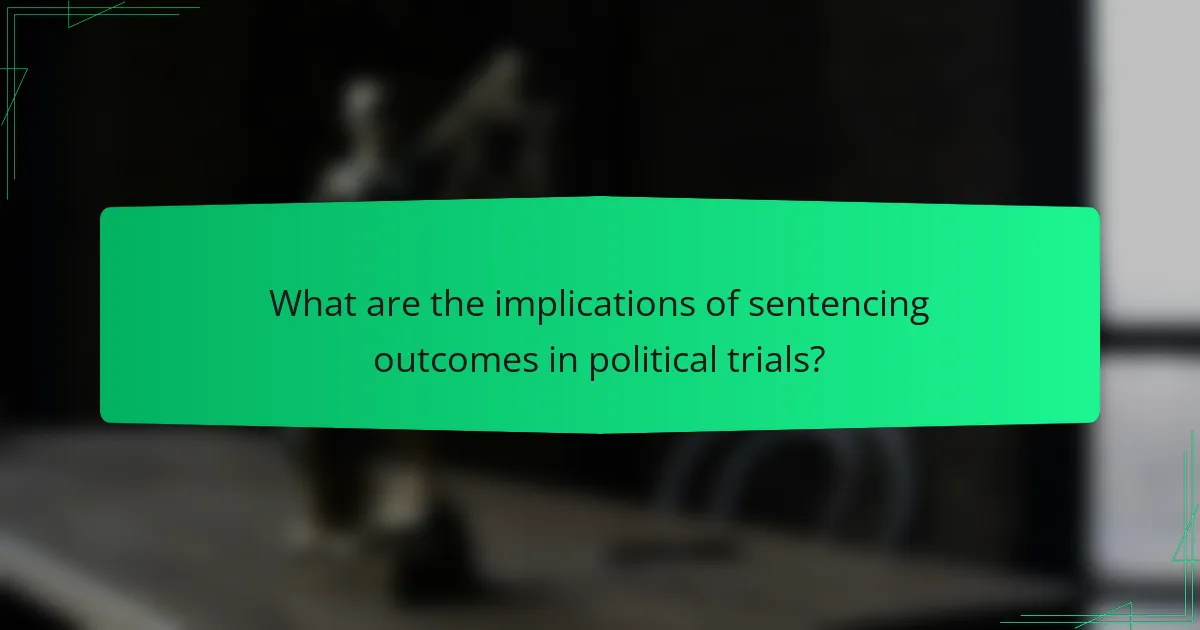
What are the implications of sentencing outcomes in political trials?
Sentencing outcomes in political trials can significantly impact public perception and political stability. These outcomes often reflect the prevailing political climate and can influence future governance. For instance, harsh sentences may deter dissent and discourage opposition, while lenient sentences may embolden activists. Historical examples include the trials of political dissidents in authoritarian regimes, where outcomes served to reinforce state power. Additionally, sentencing can affect international relations, as foreign governments may respond to perceived injustices. The implications extend to societal divisions, where sentencing outcomes can exacerbate tensions between different political factions. Overall, the outcomes serve as a barometer for the health of democratic institutions and the rule of law.
How do sentencing outcomes impact political landscapes?
Sentencing outcomes significantly influence political landscapes by shaping public perception and electoral dynamics. When a political figure receives a harsh sentence, it can lead to public outrage or support, impacting voter sentiment. For example, high-profile cases often mobilize political movements, which can alter party alignments. Additionally, sentencing outcomes can prompt legislative changes, as lawmakers respond to public pressure for reform. The aftermath of such cases may result in shifts in party power, as constituents react to perceived injustices. Historical instances, such as the sentencing of politicians in corruption cases, illustrate how judicial decisions can sway elections and policy agendas.
What are the long-term effects of severe sentencing on political dissent?
Severe sentencing on political dissent typically leads to a chilling effect on free expression. This can result in decreased public participation in political discourse. Individuals may feel deterred from voicing dissenting opinions. Historical examples include the imprisonment of political activists, which often stifles movements. In countries with harsh penalties, dissenters may face long-term social and economic repercussions. Research indicates that oppressive sentencing can result in increased political apathy among the populace. Over time, this can weaken democratic institutions and hinder social progress. The long-term implications often include a more compliant society with diminished accountability for those in power.
How do sentencing outcomes influence public trust in the judicial system?
Sentencing outcomes significantly influence public trust in the judicial system. When sentences are perceived as fair and just, public confidence in legal institutions increases. Conversely, harsh or lenient sentences can lead to skepticism and distrust. Research indicates that communities view inconsistent sentencing as a sign of bias or corruption. A study by the Pew Research Center found that 73% of Americans believe that the justice system is biased against certain groups. This perception affects overall trust in the system. Public trust is crucial for effective law enforcement and community cooperation. Therefore, equitable sentencing is essential for maintaining faith in judicial processes.
What role does media coverage play in shaping sentencing outcomes?
Media coverage significantly influences sentencing outcomes. It can sway public opinion and create pressure on judicial processes. High-profile cases often receive extensive media attention. This attention can lead to heightened scrutiny of the legal proceedings. Research indicates that judges may feel compelled to impose harsher sentences in response to public sentiment. A study by the American Psychological Association found that media portrayal of defendants can impact juror perceptions. This can ultimately affect the severity of sentences handed down. Additionally, sensationalized reporting can lead to a perception of guilt before trial. Such factors contribute to a complex relationship between media and judicial outcomes.
How does media portrayal affect public perception of trials?
Media portrayal significantly influences public perception of trials. It shapes how audiences understand the context and details of legal proceedings. Coverage can emphasize certain aspects, such as the defendant’s background or the severity of the crime. This selective focus can lead to biased perceptions among the public. Research indicates that sensationalized media coverage can increase public outrage and demand for harsher sentences. For instance, studies have shown that high-profile cases receive disproportionate media attention, impacting juror opinions and community sentiment. Additionally, the framing of a trial can affect the perceived credibility of the legal system. Overall, media narratives play a crucial role in shaping societal views on justice and accountability.
What influence does media coverage have on judicial decisions?
Media coverage can significantly influence judicial decisions. High-profile cases often receive extensive media attention. This coverage can shape public opinion and create pressure on judicial proceedings. Judges may feel compelled to consider public sentiment when making decisions. Studies show that jurors can be affected by pre-trial publicity. For example, a 2018 study published in the Journal of Criminal Justice found that jurors exposed to biased media coverage were more likely to render guilty verdicts. Additionally, media narratives can impact the perceived credibility of evidence. Ultimately, media coverage can affect both the severity and duration of sentencing outcomes in political trials.
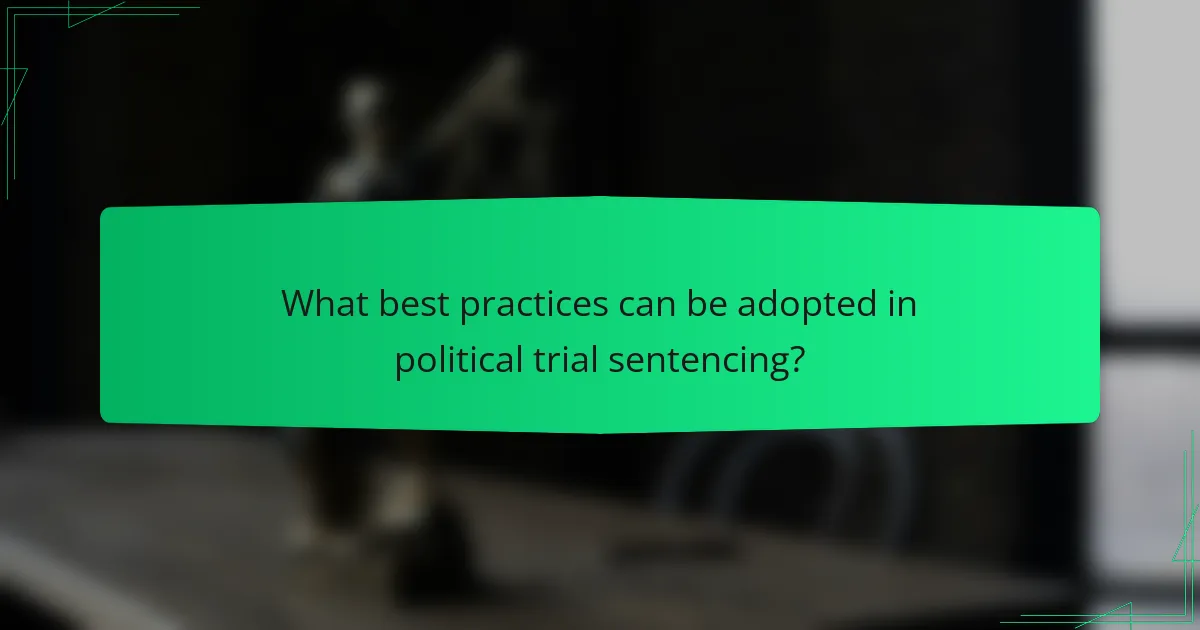
What best practices can be adopted in political trial sentencing?
Best practices in political trial sentencing include ensuring transparency, maintaining impartiality, and adhering to legal standards. Transparency fosters public trust in the judicial process. Impartiality helps mitigate bias, promoting fair outcomes. Adhering to legal standards ensures consistency and protects defendants’ rights. Utilizing evidence-based practices can also enhance sentencing decisions. This approach aligns with guidelines from organizations like the American Bar Association, which advocates for fair trial standards. Implementing these practices can lead to more equitable sentencing in politically sensitive cases.
How can fairness be ensured in sentencing outcomes?
Fairness in sentencing outcomes can be ensured through standardized guidelines and training for judges. Implementing clear sentencing guidelines reduces variability in decisions. Judges should receive training on implicit biases to promote equitable treatment. Regular audits of sentencing decisions can identify disparities based on race or socioeconomic status. Transparency in the sentencing process fosters public trust and accountability. Utilizing statistical analysis can help assess the fairness of sentencing patterns. Research indicates that jurisdictions with standardized guidelines report more consistent outcomes. These measures collectively contribute to a fairer justice system.
What measures can be taken to reduce bias in sentencing?
Implementing standardized sentencing guidelines can reduce bias in sentencing. These guidelines provide a framework for judges to follow, ensuring consistency in sentencing decisions. Training programs for judges on implicit bias are essential. Such training increases awareness of personal biases that may affect decision-making. Utilizing risk assessment tools can help evaluate offenders objectively. These tools rely on data rather than subjective judgment. Promoting transparency in the sentencing process is also crucial. Public access to sentencing data allows for accountability and scrutiny. Lastly, fostering diversity within the judiciary can lead to varied perspectives in sentencing. Research indicates that diverse panels are more likely to consider multiple viewpoints, reducing bias.
How can transparency in sentencing be improved?
Transparency in sentencing can be improved by implementing standardized sentencing guidelines. These guidelines provide judges with clear parameters for sentencing decisions. They help reduce disparities in sentencing outcomes across similar cases. Additionally, increasing public access to sentencing data enhances accountability. This access allows stakeholders to analyze trends and patterns in sentencing. Regular training for judges on transparency principles can further support these efforts. Research indicates that jurisdictions with clear guidelines report higher public trust in the judicial system. Enhanced transparency fosters a sense of fairness and justice in sentencing practices.
What are common challenges faced in political trial sentencing?
Common challenges in political trial sentencing include bias in the judicial process. Political motivations can influence judges and juries. This can lead to unfair sentencing outcomes. Additionally, the lack of legal precedent complicates cases. Political trials often involve unprecedented issues. This results in inconsistent rulings across different jurisdictions. Public opinion may also pressure the judicial system. Sentences may be swayed by societal reactions rather than legal standards. Furthermore, limited access to legal resources can hinder defendants. This affects their ability to mount a robust defense.
What obstacles do judges encounter in political trials?
Judges encounter several obstacles in political trials. One significant challenge is the influence of public opinion. High-profile cases often attract media attention, which can pressure judges to sway their decisions. Another obstacle is political pressure from government entities. Judges may face threats or intimidation that affect their impartiality. Additionally, legal complexities arise due to the involvement of constitutional issues. These cases often require navigating intricate legal frameworks. Judges also deal with limited resources, which can hinder their ability to conduct thorough investigations. Lastly, biases may arise from personal beliefs or societal norms, impacting judicial fairness.
How can the judicial system address these challenges effectively?
The judicial system can address challenges in political trials effectively by implementing standardized sentencing guidelines. These guidelines ensure consistency and fairness in sentencing outcomes. They can help reduce the influence of political bias in judicial decisions. Additionally, increasing transparency in trial proceedings can enhance public trust in the judicial process. Studies show that transparency correlates with greater accountability among judges. Training programs for judges on political sensitivities can also mitigate biases. Research indicates that informed judges make more equitable decisions. Furthermore, establishing independent review boards can provide oversight on sentencing practices. These measures collectively contribute to a more reliable judicial process in political trials.
Sentencing outcomes in political trials refer to the legal consequences faced by individuals convicted in cases with political implications. This article examines the factors influencing the severity and duration of these outcomes, including the nature of the political offense, jurisdictional differences, public sentiment, and the role of judges. It also explores how legal frameworks, international standards, and media coverage impact sentencing decisions. Additionally, the implications of these outcomes on public trust in the judicial system and political landscapes are analyzed, highlighting the importance of fairness and transparency in the sentencing process.
